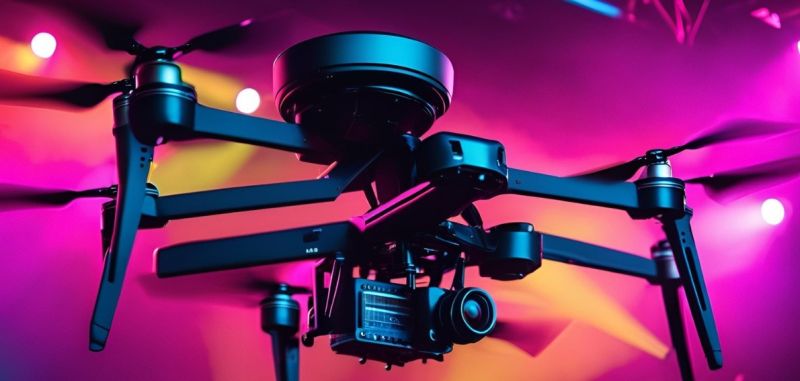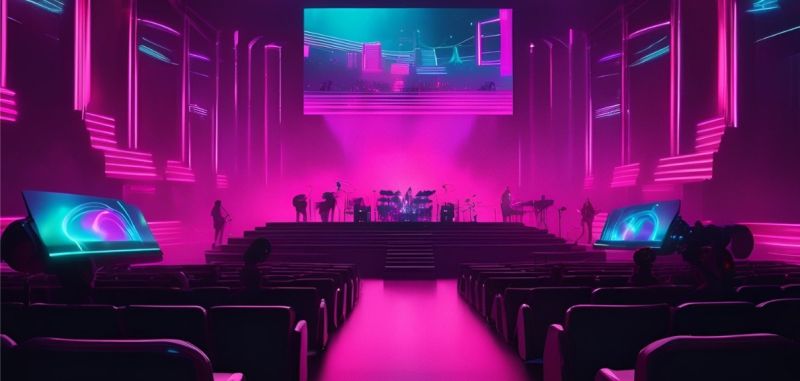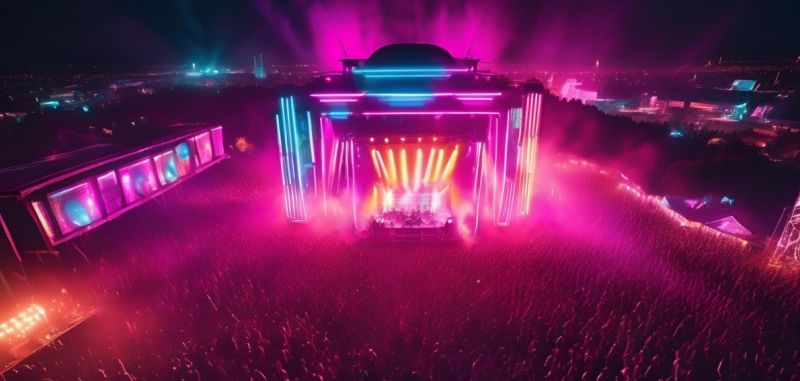As we move further into 2025, the landscape of live events, particularly music concerts, is rapidly evolving with the help of cutting-edge on ground technologies. Audience engagement has become a critical aspect of modern music concerts, redefining the connections between artists and fans.
From enhancing the attendee experience to improving operational efficiency and safety, technology is playing an increasingly pivotal role in the way concerts are planned, executed, and enjoyed. Here are some of the most exciting on ground event technologies to look out for in 2025 and how they’re transforming music concerts.
1. Secure Ticketing Solutions for Event Organizers and Fair Access

The music industry has witnessed a significant shift in ticketing solutions, with a growing emphasis on secure and fair access for event organizers and attendees alike. The rise of blockchain-based ticketing systems has revolutionized the way events handle ticket sales and distribution. These systems offer secure and transparent transactions, significantly reducing unauthorized reselling and ensuring prices remain within reasonable limits.
Event organizers are also implementing dynamic pricing models that adjust ticket costs based on real-time demand. Personalized ticketing systems now incorporate attendee information directly into tickets, making unauthorized transfers more difficult. Many venues have begun implementing biometric authentication at entry points, ensuring that only legitimate ticket holders gain access to events. This not only enhances security but also provides valuable insights into audience behavior and preferences.
Why It Matters for Music Concerts in 2025:
- Ensures fair access and reduces ticket fraud.
- Provides event organizers with valuable data on attendee preferences.
- Enhances security and streamlines entry processes.
Also Read: Top Event Ticketing Platforms: Which One’s Best for Your Events
2. RFID Technology for Seamless Event Access and Cashless Payments

RFID (Radio Frequency Identification) technology has already made waves in the world of event ticketing, but its use is expanding significantly for music concerts. In 2025, expect to see RFID wristbands or cards as standard at concerts for entry, crowd management, and cashless payments. This technology also enhances the live performance experience by integrating with sophisticated lighting and sound systems, making concerts more immersive and interactive.
RFID wristbands allow for quick, touchless entry into venues, significantly reducing wait times at gates. Attendees simply scan their wristband, and the system instantly grants them access, making the process fast and efficient. This technology is also integrated with cashless payment systems, allowing concert-goers to make food, drink, or merchandise purchases by simply tapping their wristband at designated points.
Also Read: How to Use RFID for On-Site Event Payments and Access Control: Benefits and Best Practices
Why It Matters for Music Concerts in 2025:
- Faster, more efficient entry and exit.
- Reduced need for cash handling, improving hygiene and convenience.
- Real-time tracking of attendee movements for crowd management and safety.
3. Augmented Reality (AR) for Immersive Experiences

Augmented Reality (AR) is increasingly becoming a major player in the live event space, particularly at music concerts. In 2025, AR will be used to create immersive experiences that engage attendees beyond just the music.
Concert organizers can leverage AR through apps that attendees download to their smartphones. These apps can overlay digital content onto the physical environment, such as 3D visual effects during performances, virtual meet-and-greets with artists, or interactive elements that bring a whole new dimension to the concert experience. Some concerts may even have AR-enhanced stages or exclusive behind-the-scenes content that fans can view by pointing their phone at certain areas of the venue.
Also Read: What You Need To Know About AR And VR Technology To Create Unforgettable Events
Why It Matters for Music Concerts in 2025:
- Engages fans in unique and interactive ways.
- Enhances live performances with digital overlays and visuals.
- Creates memorable, Instagram-worthy experiences.
4. AI-Powered Personalization for Concert Goers

Artificial Intelligence (AI) is helping shape the way concert experiences are personalized for fans. In 2025, expect to see AI-driven platforms that collect data from ticket purchases, past event attendance, and social media activity to tailor concert experiences. AI can also leverage social media platforms to enhance audience engagement by facilitating live sessions and interactive events, fostering deeper connections between artists and their fans.
AI can recommend specific shows based on a fan’s musical preferences, personalize in-app notifications about setlists, and even optimize the event experience based on crowd behavior. For example, AI could direct attendees to less crowded areas for concessions or bathrooms, reducing wait times. In addition, AI-powered chatbots may handle customer service inquiries on-site, helping attendees with everything from lost items to finding their way around the venue.
Why It Matters for Music Concerts in 2025:
- Customizes the experience for each attendee, making them feel valued.
- Reduces friction points, like long lines and confusion.
- Improves operational efficiency with AI-powered crowd management.
5. Drones for Aerial Filming and Crowd Management

Drones have already begun to make a splash in live events, and by 2025, they will play an even more integral role in music concerts. Drones are being used at music festivals to enhance the overall experience by integrating Audio-Visual (AV) and Augmented Reality (AR) technologies, creating immersive and interactive environments. With the ability to capture breathtaking aerial footage, drones are used to film live performances from unique angles, providing audiences both in-person and online with dynamic, high-quality video.
Beyond filming, drones are also being used for crowd management and safety. Equipped with thermal sensors and cameras, drones can monitor crowd density in real-time, providing valuable data to event organizers to prevent overcrowding and ensure safe spacing in key areas like entrances, stages, and seating zones.
Why It Matters for Music Concerts in 2025:
- Offers fans new perspectives through aerial video footage.
- Enhances crowd safety and management by providing real-time surveillance.
- Captures high-quality content for post-event promotions or streaming.
Also Read: 5 Technological Innovations That Will Create A Better Experience At Your Event
6. Wearable Technology for Health & Safety

Health and safety are top priorities for concert organizers, especially in the post-pandemic era. By 2025, wearable technologies will be common at live music events to help monitor crowd health and ensure a safe environment. Virtual stages can be integrated with wearable technology to enhance the concert experience, allowing audiences to enjoy immersive visuals and dynamic backdrops from different viewing positions.
Wearables, like smart wristbands or body sensors, can monitor heart rates, body temperatures, and other health indicators, which can be used to detect potential emergencies or signs of illness in real-time. In the event of a crowd control issue or medical emergency, wearables can immediately alert security and medical teams, improving response times.
Additionally, wearables can be linked to apps that track social distancing, ensure mask compliance (if needed), and notify attendees about specific health protocols, creating a more secure and responsive event environment.
Why It Matters for Music Concerts in 2025:
- Enhances overall event safety and health monitoring.
- Improves emergency response with real-time health data.
- Increases attendee confidence by adhering to safety standards.
7. Mobile Technology for Enhanced Fan Engagement

The evolution of mobile technology has transformed how music fans interact with live music events, creating more dynamic and participatory experiences. Event-specific mobile apps now serve as comprehensive platforms for engagement, offering features such as high-quality live streaming, exclusive content access, and interactive experiences. Social media integration has become seamless, allowing attendees to share their experiences in real-time and connect with other fans worldwide.
Also Read: The Definitive Checklist To Setting Up And Streaming An Online Event
Venues are leveraging this technology to provide instant updates, virtual meet-and-greet opportunities, and exclusive behind-the-scenes content, creating a more immersive and connected event experience. Mobile platforms have evolved to become essential tools for enhancing the overall concert experience. Advanced mapping features help attendees navigate large venues and festivals, with real-time updates on crowd density and wait times at various locations. Integration with food and beverage vendors allows fans to order refreshments directly to their seats, minimizing time spent in queues.
Why It Matters for Music Concerts in 2025:
- Enhances fan engagement through interactive and exclusive content.
- Streamlines the concert experience with real-time updates and navigation.
- Reduces wait times and improves overall attendee satisfaction.
8. Advanced Connectivity Solutions

The widespread adoption of 5G technology and wearable devices has revolutionized the concert experience. High-speed connectivity enables seamless streaming and instant communication, while smart wristbands and RFID technology facilitate smooth entry and cashless transactions. These wearable devices enhance security and provide valuable insights into audience behavior and preferences.
The integration of biometric entry systems has streamlined venue access, significantly reducing wait times while maintaining high security standards. This technology also enables personalized experiences, such as automatic VIP area access and custom content delivery based on individual preferences. Smart fabric technology integrated into event merchandise can now respond to music rhythms with synchronized lighting effects, creating immersive light shows throughout the crowd. Advanced haptic feedback systems in wearable devices allow fans to physically feel bass drops and key moments in performances, adding a new dimension to the musical experience.
Why It Matters for Music Concerts in 2025:
- Enhances the concert experience with high-speed connectivity and smart wearables.
- Improves security and streamlines entry processes.
- Creates immersive and personalized experiences for attendees.
9. Virtual and Hybrid Concerts

Though we’re focusing on on ground event technology, the rise of digital concerts and hybrid concerts has had a significant impact on music events in recent years and will continue to play an important role in 2025. Thanks to advances in streaming technology, more artists and event organizers are offering virtual tickets or hybrid concert experiences where audiences can participate both in-person and remotely.
In 2025, expect high-quality, immersive virtual experiences that replicate the live concert experience with VR (Virtual Reality) and 360-degree live streaming. For those who can’t make it to the venue, these technologies will provide an alternative way to enjoy the concert from home with interactive features like live chat, virtual merchandise stands, and the ability to choose your camera angle.
Why It Matters for Music Concerts in 2025:
- Expands the concert’s reach to a global audience.
- Provides a more inclusive experience for those unable to attend in person.
- Blends virtual and physical worlds for a dynamic concert experience.
Also Read: Hybrid Events: 5 Important Considerations To See If It’s Right For You And Your Audience
10. Sustainable Technology and Green Solutions

Sustainability is increasingly becoming a priority for live events, and music concerts in 2025 will feature eco-friendly technologies aimed at reducing the environmental footprint. Technologies like solar-powered stages, biodegradable wristbands, and electric vehicle (EV) charging stations will become more prevalent.
Additionally, some festivals and concerts are experimenting with carbon offset initiatives and waste-reduction tech, such as digital ticketing and food waste tracking systems. This focus on sustainability will resonate with eco-conscious fans and contribute to a greener future for the live event industry.
Why It Matters for Music Concerts in 2025:
- Reduces the environmental impact of large-scale events.
- Meets the growing demand for sustainability in entertainment.
- Promotes responsible event management that appeals to eco-conscious audiences.
Also Read: 5 Key Tips for Organizing an Environmentally Sustainable Music Festival
Conclusion: The Future of Music Concerts is Tech-Enhanced
In 2025, on ground event technology will continue to transform the music concert experience, making it safer, more immersive, and more personalized than ever before. From RFID wristbands and AI-powered personalization to drones, wearables, and hybrid concert formats, technology is enabling music events to reach new heights of efficiency, engagement, and safety. As concert-goers demand more innovative and seamless experiences, these technologies will help organizers meet those expectations and create unforgettable events.
If you’re planning or attending a concert in 2025, get ready for a tech-driven experience that enhances every aspect of the show—both on and off the stage.
You May Also Like:
Music Event Technology Trends 2025: Innovations Shaping the Future of Live Music Experiences
Anti Scalping for Event Management: Why These Measures Are Essential – A Complete Guide
5 Essential Elements for a Successful Live Event Brand Partnership Strategy



 15th April 2025
15th April 2025